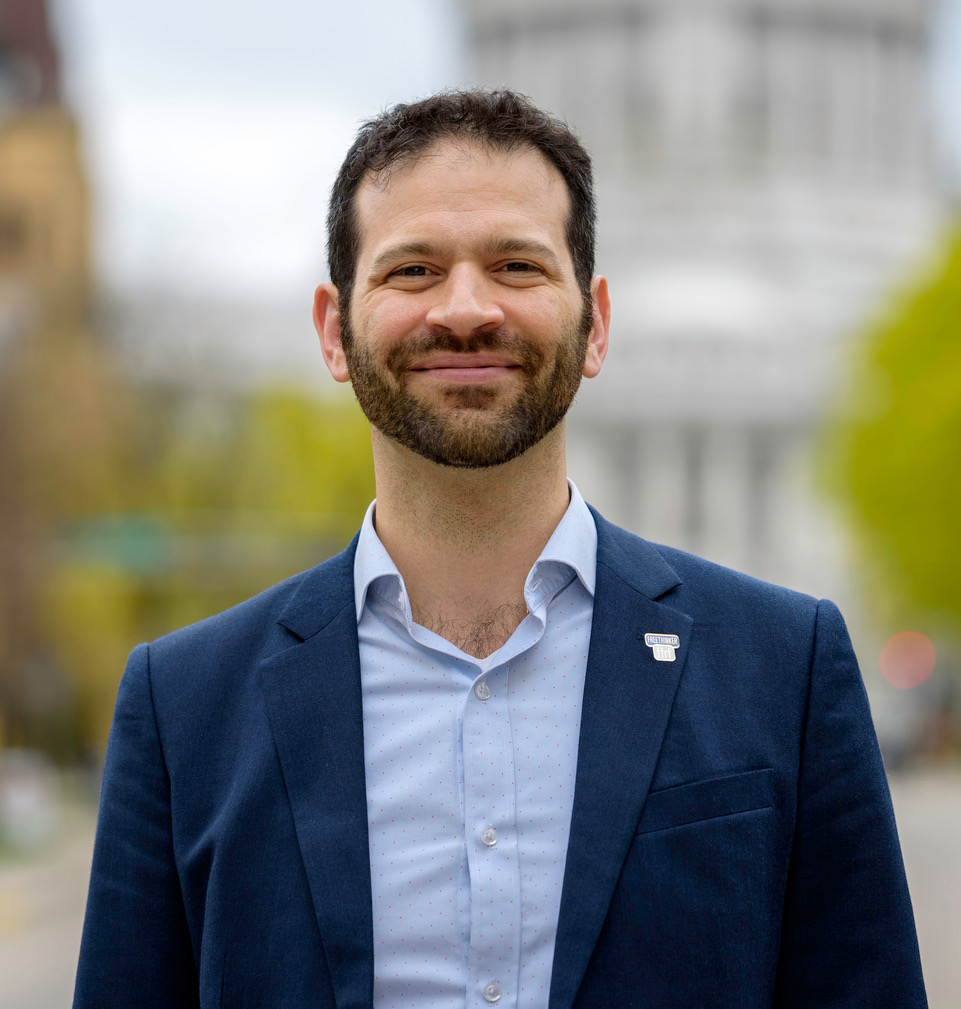 While in Madison for FFRF’s national convention last month, I visited Wisconsin’s grand state Capitol. Inside the massive dome are four awe-inspiring mosaics consisting of approximately 400,000 pieces of glass tile. They represent Wisconsin’s three branches of government and liberty. If a handful of glass pieces were removed, the great mosaics would be diminished. Examine an individual glass piece on its own and out of context, and it seems insignificant.
While in Madison for FFRF’s national convention last month, I visited Wisconsin’s grand state Capitol. Inside the massive dome are four awe-inspiring mosaics consisting of approximately 400,000 pieces of glass tile. They represent Wisconsin’s three branches of government and liberty. If a handful of glass pieces were removed, the great mosaics would be diminished. Examine an individual glass piece on its own and out of context, and it seems insignificant.
Government relations is a similar mosaic. Thousands of small, critical actions — many by concerned citizens — add up to a grand and elegant whole. At FFRF, our government relations activities add up to fighting Christian Nationalism and working toward a more secular union.
We’re making progress. FFRF has helped grow the Congressional Freethought Caucus, advanced key bills and made gains in the budget process — lots of critical small elements that are creating something big.
Expanding the Congressional Freethought Caucus
The Congressional Freethought Caucus continues to grow in numbers and strength. It was very exciting to witness Rep. Mark Pocan, D-Wis., declare himself a freethinker at the FFRF convention. He identifies as part of the 26 percent of the American population that now does not follow a specific religion. We expect more of his colleagues to join him.
Two new members recently joined the Congressional Freethought Caucus, Reps. Susan Wild, D-Pa., and Sean Casten, D-Ill. Both are first-year members. Wild is the first member of the caucus on the Foreign Affairs Committee and can help hold Secretary of State Mike Pompeo responsible for his actions. Casten is the first member of the caucus on the Science, Space and Technology Committee and can help advance the Scientific Integrity Act. Both are from swing districts. This shows the broad appeal of the caucus and its goals, and the greater support of the freethought community.
The Congressional Freethought Caucus has weighed in on some of FFRF’s priority bills. Numerous caucus members have recently signed a support letter for the No Ban Act to overturn President Trump’s Muslim-majority travel ban. This action demonstrates deeper support for the bill and shows the No Ban Act is a high-priority piece of legislation. It also demonstrates to the other members that members of the caucus are going to be more active, weighing in on legislation and making their voices heard throughout the chamber.
March to 218
We keep adding new co-sponsors on our key bills in the House: Do No Harm Act (154), No Ban Act (198) and the Scientific Integrity Act (229). All of these bills guard against Christian Nationalism and protect our secular values. When a bill has 218 co-sponsors, it signals to leadership that a majority of members support it. This means the bill is unlikely to get bogged down with amendments that eat up valuable floor and committee time.
The Scientific Integrity Act crossed that threshold, and we hope it will get to the floor in the near future. The Scientific Integrity Act empowers public scientists to publish their peer-reviewed research and share their expertise with the public, holds accountable government officials who attempt to manipulate or suppress research, and protects researchers from retaliation when they arrive at or share politically contentious research results. It also protects researchers when they act as whistleblowers.
FFRF and our members are concerned that scientific research is ignored or corrupted by religious or political dogma, especially with regard to important issues like human sexuality, medical research and the global climate crisis. The Scientific Integrity Act is the best bill I have seen to protect against those threats.
Budget insertions
We’ve also been racking up legislative victories — a difficult task with a divided government. One of our key legislative objectives is to make sure all Americans have access to a secular support recovery option, which is a constitutional right. Religious 12-step programs are widely available and are often a default treatment option. We are increasing the recovery options for all Americans. Pending passage, we got an insertion into the budget that empowers federal agencies to work with secular mutual-support recovery providers. Getting an insertion into the budget is extremely difficult. It takes a lot of shoe leather campaigning and we’ve got excellent partners within the secular community, such as the Secular Coalition for America, American Atheists and the Center for Inquiry, and with secular recovery providers, such as SMART Recovery and LifeRing.
Growing our movement
In the next few months, we will keep advancing our key bills, solidifying our budget requests and expanding the Congressional Freethought Caucus. FFRF has about 30,000 members. There is power in that number. But there is greater power in greater numbers. With 60,000 members FFRF’s “might happen” efforts could become “will happen.” With 60,000 members, FFRF will get our bills to the floor, our ideas into the budget, and far more members of Congress joining the Freethought Caucus. To help grow our movement, you can share FFRF with your friends and encourage them to become members. The best thing you can do today is share FFRF’s website (www.ffrf.org) with five friends and ask if they like what they see, would they please consider becoming a member?
All the best,
![]()
Mark Dann
Director of Governmental Affairs
Freedom From Religion Foundation, Inc.

